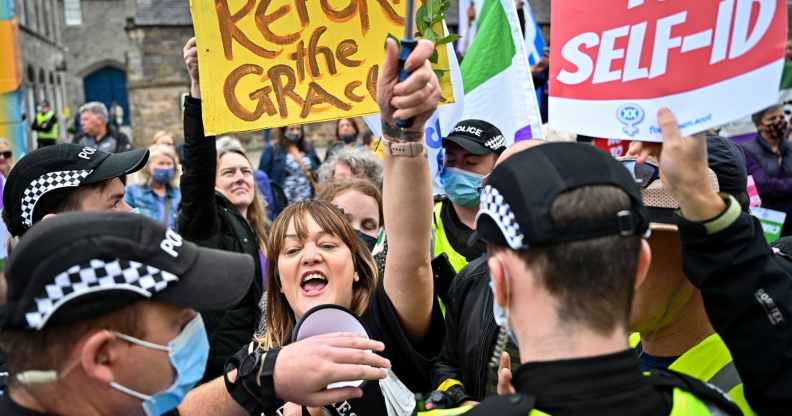UK named alongside Russia, Poland and Hungary in damning LGBT+ hate report due to transphobia

Scottish trans rights activists hold a demonstration next to an anti-trans demo on 2 September 2021 in Edinburgh, Scotland (Jeff J Mitchell/Getty)
The UK has been singled out for its “baseless and concerning” anti-trans rhetoric in a damning report on rising hate against LGBT+ people in Europe.
The extensive report was published by the Council of Europe, the continent’s leading human rights organisation, on Tuesday (21 September).
It describes “a marked increase” in anti-LGBT+ hate speech and hate crime and condemns “with particular force the extensive and often virulent attacks” on LGBT+ rights in the UK, which is named alongside Hungary, Poland, Turkey and the Russian Federation.
The council notes that these attacks “deliberately mis-characterise the fight for the equality of LGBTI people as so-called ‘gender ideology’ and seek to stifle the identities and realities of all those who challenge the social constructs that perpetuate gender inequalities and gender-based violence in our societies.
“These attacks are harmful to women as well as LGBTI people,” it adds.
The UK is specifically mentioned throughout the report, which makes particular reference to the growing problem of anti-LGBT+ hate speech on social media.
The 18-page report dedicates an entire, shameful section to the UK’s rise in anti-trans rhetoric, noting with concern how it often questions the very existence of gender as a category of protection under international human rights law.
This dangerous discourse has been “gaining baseless and concerning credibility” at the expense of trans people’s civil liberties and women’s and children’s rights, it warns.
“At the IDAHOT Forum 2021, [Kemi Badenoch] stated, in contradiction with international human rights standards with respect to the rights of trans people: ‘We do not believe in self-identification.’
“Such rhetoric – which denies trans identities – is being used to roll back the rights of trans and non-binary people and is contributing to growing human rights problems.”
The report notes that UK hate crime statistics show a sharp increase in transphobic crimes since 2015, though though only 1 in 7 victims report them, and many trans people now fear for their safety.
“There is intense and ongoing social, political and legal debate about what constitutes harmful discourse when it comes to trans people and their rights,” it continues, “and arguments defending freedom of expression have been – and are still being – used as a tool to justify transphobic rhetoric, further penalising and harming already marginalised trans people and communities.
“It is also becoming increasingly difficult for individuals and organisations to publicly affirm young trans people without being subject to hostility and disproportionate questioning from wider society.
“The ‘gender-critical’ movement, which wrongly portrays trans rights as posing a particular threat to cisgender women and girls, has played a significant role in this process.”
The council also identifies several “vitriolic media campaigns” in which trans women have been “vilified and misrepresented” and says that trans healthcare is also being “erroneously portrayed” as a form of LGB conversion therapy.
Despite this concerning track record, the UK government plans to encourage other countries to tackle LGBT+ inequality at its first global LGBT conference, ‘Safe to Be Me,’ next year.
The event promises to bring together elected officials, policy makers, and the international LGBT+ community to “protect and promote” the rights of LGBT+ people around the world.
PinkNews has reached out to the Equalities Office for comment. A spokesperson said: “This government is fully committed to advancing LGBT rights and championing equality and the UK continues to be recognised as one of the top 10 most progressive countries in Europe for LGBT rights.
“We have legalised same-sex marriage, including in Northern Ireland, passed the Turing Law and introduced one of the world’s most comprehensive legislative frameworks for protecting LGBT people from discrimination.”

